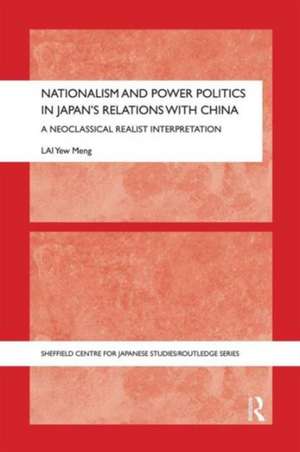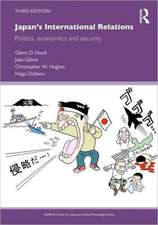Nationalism and Power Politics in Japan's Relations with China: A Neoclassical Realist Interpretation: The University of Sheffield/Routledge Japanese Studies Series
Autor Yew Meng Laien Limba Engleză Paperback – 4 aug 2015
This book systematically explores the complex dynamics that shape contemporary Japanese-Chinese relations. In particular, it analyses the so-called ‘revival’ of nationalism in post-Cold War Japan, its causality in redefining Japan’s external policy orientations, and its impact on the atmosphere of the bilateral relationship. Further, by adopting a neoclassical realist model of state behaviour and preferences, Lai Yew Meng examines two highly visible bilateral case studies: the Japanese-Chinese debacle over prime ministerial visits to Yasukuni Shrine, and the multi-dimensional dispute in the East China Sea which comprises the Senkaku/Diaoyudao territorial row, alleged Chinese maritime incursions, and bilateral competition for energy resources. Through these examples, this book explores whether nationalism really matters; when, and under what circumstances nationalism becomes most salient; and the extent to which the emotional dimensions of nationalism manifest most profoundly in Japanese state-elites’ policy decision-making.
This timely book will be of great interest to students and scholars of both Japanese and Chinese politics, as well as those interested in international relations, nationalism, foreign policy and security studies more broadly.
| Toate formatele și edițiile | Preț | Express |
|---|---|---|
| Paperback (1) | 412.37 lei 43-57 zile | |
| Taylor & Francis – 4 aug 2015 | 412.37 lei 43-57 zile | |
| Hardback (1) | 1060.43 lei 43-57 zile | |
| Taylor & Francis – 18 iul 2013 | 1060.43 lei 43-57 zile |
Din seria The University of Sheffield/Routledge Japanese Studies Series
-
 Preț: 411.42 lei
Preț: 411.42 lei -
 Preț: 436.14 lei
Preț: 436.14 lei - 15%
 Preț: 467.44 lei
Preț: 467.44 lei -
 Preț: 415.67 lei
Preț: 415.67 lei -
 Preț: 485.84 lei
Preț: 485.84 lei -
 Preț: 458.63 lei
Preț: 458.63 lei - 18%
 Preț: 1109.18 lei
Preț: 1109.18 lei - 18%
 Preț: 1057.75 lei
Preț: 1057.75 lei -
 Preț: 271.05 lei
Preț: 271.05 lei -
 Preț: 410.66 lei
Preț: 410.66 lei -
 Preț: 416.52 lei
Preț: 416.52 lei -
 Preț: 411.64 lei
Preț: 411.64 lei - 17%
 Preț: 172.64 lei
Preț: 172.64 lei - 12%
 Preț: 299.52 lei
Preț: 299.52 lei - 12%
 Preț: 299.52 lei
Preț: 299.52 lei -
 Preț: 292.46 lei
Preț: 292.46 lei - 19%
 Preț: 255.84 lei
Preț: 255.84 lei -
 Preț: 372.58 lei
Preț: 372.58 lei -
 Preț: 322.31 lei
Preț: 322.31 lei -
 Preț: 195.62 lei
Preț: 195.62 lei - 18%
 Preț: 1053.57 lei
Preț: 1053.57 lei -
 Preț: 414.39 lei
Preț: 414.39 lei - 18%
 Preț: 1007.48 lei
Preț: 1007.48 lei - 18%
 Preț: 1326.72 lei
Preț: 1326.72 lei -
 Preț: 416.22 lei
Preț: 416.22 lei -
 Preț: 485.61 lei
Preț: 485.61 lei - 18%
 Preț: 1057.05 lei
Preț: 1057.05 lei -
 Preț: 282.62 lei
Preț: 282.62 lei -
 Preț: 416.22 lei
Preț: 416.22 lei - 18%
 Preț: 1005.80 lei
Preț: 1005.80 lei -
 Preț: 419.50 lei
Preț: 419.50 lei -
 Preț: 487.37 lei
Preț: 487.37 lei
Preț: 412.37 lei
Nou
Puncte Express: 619
Preț estimativ în valută:
78.91€ • 82.59$ • 65.68£
78.91€ • 82.59$ • 65.68£
Carte tipărită la comandă
Livrare economică 31 martie-14 aprilie
Preluare comenzi: 021 569.72.76
Specificații
ISBN-13: 9781138120372
ISBN-10: 1138120375
Pagini: 264
Ilustrații: 14
Dimensiuni: 156 x 234 x 14 mm
Greutate: 0.36 kg
Ediția:1
Editura: Taylor & Francis
Colecția Routledge
Seria The University of Sheffield/Routledge Japanese Studies Series
Locul publicării:Oxford, United Kingdom
ISBN-10: 1138120375
Pagini: 264
Ilustrații: 14
Dimensiuni: 156 x 234 x 14 mm
Greutate: 0.36 kg
Ediția:1
Editura: Taylor & Francis
Colecția Routledge
Seria The University of Sheffield/Routledge Japanese Studies Series
Locul publicării:Oxford, United Kingdom
Public țintă
Postgraduate and UndergraduateCuprins
Introduction 1. Interpreting nationalism in Japanese-Chinese relations: contending approaches and analytical frameworks 2. The trends, development, and dynamics of Japanese-Chinese relations 3. Theories of nationalism and its manifestations in Japan 4. Nationalism, Japan’s China policy-making, and Japanese-Chinese relations 5. Case Study I: The Yasukuni Shrine dispute 6. Case Study II: The East China Sea dispute 7. Conclusion
Notă biografică
LAI Yew Meng is Senior Lecturer in Politics and International Relations at the Centre for the Promotion of Knowledge and Language Learning (CPKLL), Universiti Malaysia Sabah.
Descriere
This book systematically explores the complex dynamics that shape contemporary Japanese-Chinese relations, and in particular, analyses the so-called ‘revival’ of nationalism in post-Cold War Japan and its impact on the atmosphere of the bilateral relationship. Further, by adopting a neoclassical realist model of state behaviour and preferences, Lai Yew Meng examines two highly visible bilateral case studies to explore whether nationalism really matters; when, and under what circumstances nationalism becomes most salient; and the extent to which the emotional and/or instrumental dimensions of nationalism manifest most profoundly in Japanese state-elites’ policy decision-making.













